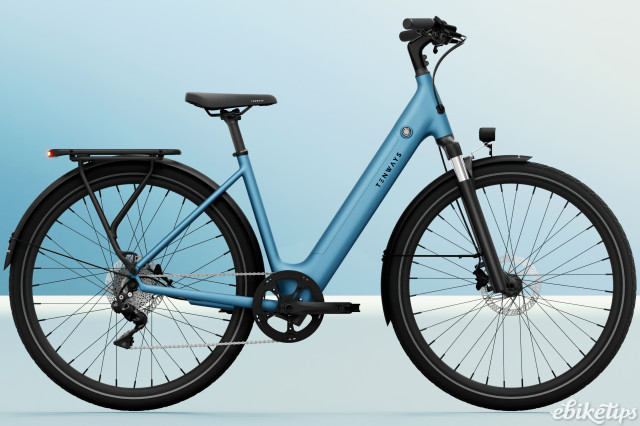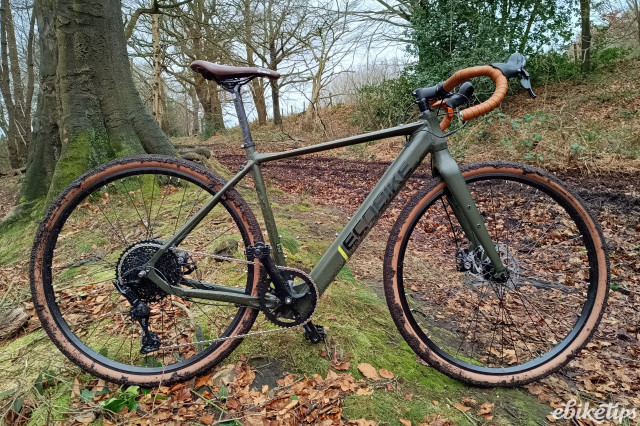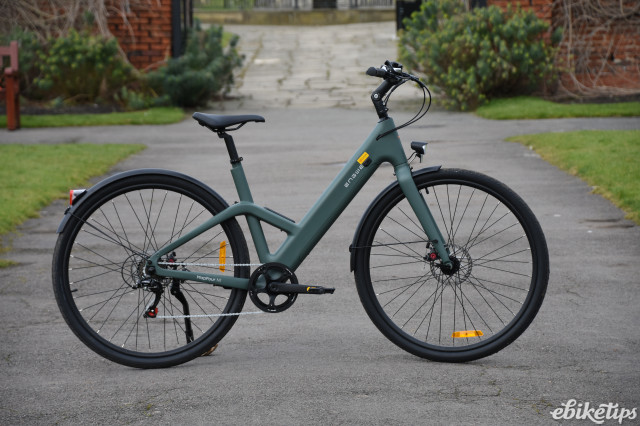eBikeTips recently met up with the fledgling British folding e-bike company FLIT Bike, who launched last summer and are about to deliver to their first customers this autumn. We went to find out more about the bike, and took it for a quick spin...
Review: Gocycle GX
7 of the best folding e-bikes 2020
Described as "a brand new generation of folding e-bike for urban commuters", the FLIT-16 is engineered in Cambridge and weighs in at just 15kg. It has a compact fold, a clean, simple design and all the electrical components built into the frame. FLIT say that most people don't realise it's electric when seeing the bike for the first time, with the battery also coming fully built into the top tube
As a bonus, integrating the battery in this way reduces weight and maximises frame rigidity by increasing the top tube diameter and removing the traditional centre hinge found on most folding e-bikes. This means that the FLIT-16's frame shouldn't flex as much as a traditional folding bike.
Folding down in just 10 seconds, the front and rear parts of the frame securely lock together. This means that the folded e-bike can either be carried, or rolled on its rear wheel, maximising manoeuvrability around the city. For a smooth ride, the FLIT-16 also has a custom suspension unit consisting of aluminium fins interspersed with elastomer discs. The position of the suspension unit means that it generates a lot of heat. FLIT claim that on the FLIT-16, the elastomer discs convert movement from bumpy roads into heat, whilst the aluminium fins draw the heat away.
The frame is made from heat-treated 6000 series aluminium alloy, and the hinges, usually the part of a folding bike frame most vulnerable to wear, feature stainless steel reinforcements that should maximise the life of the frame.
Other highlights include a dual side torque sensor, high torque 220W rear hub motor, and 5 levels of motor assistance. The internal 230Wh battery gives a range of 20-30 miles (30-50km) on a single charge, and you also get a frame-integrated rear light and a front LED. Full specifications for the FLIT-16 can be found here.
Some brand history
FLIT was founded by Dave Henderson and Alex Murray in 2016, with Henderson coming from a car engineering background and Murray a keen endurance cyclist who had ridden across Europe, China, and the USA. Both were particularly interested in how different types of e-bikes would adapt to electrification, and decided there needed to be a better folding e-bike solution: "Most of the existing models took a folding bike design, tweaked it, and strapped on a battery and a motor to become electric", claims Murray. By designing a folding e-bike from scratch, they thought they could make something better.
Setting up in the UK's 'cycling capital' of Cambridge, FLIT received backing from the likes of the University of Cambridge Judge Business School, the Allia Future Business Centre, and the Design Council. Murrary said that throughout the design process, the team has been supported by bike shops and a core group of keen test riders who have constantly been there to try out new ideas: "This has helped ensure that the FLIT-16 isn't just built to be a good e-bike to ride, but is also a good e-bike to maintain and use in everyday life", he added.
As the design was finalised, FLIT started searching for manufacturing partners and settled on a factory in Taiwan, a country at the forefront of the emerging e-bike boom. After a year working with the factory to produce a fully functional prototype, the FLIT-16 was launched in a pre-sales campaign on the Kickstarter crowdfunding platform in July 2019, and was selected as one of the finalists for the Eurobike Startup Awards in Germany that year. 500 test rides and a few tweaks later, FLIT have been preparing the bike for manufacturing despite the disruption caused by the pandemic, and are on track to deliver the first batch of bikes to customers by Autumn 2020.
Test ride
I took a FLIT-16 test bike around the hilly paths of Sheffield’s Norfolk Heritage Park. My first impressions were that it’s pretty light for an e-bike, especially one with a 230Wh battery; lightweight e-bikes often skimp on battery size, but this one seems a good compromise between the conflicting options of adding capacity and range at the cost of extra weight. Our own Park Tool scales gave a weight of 15.2kg, inclusive of battery and ‘extras’ such as the mudguards and kickstand. It’s certainly one of the lighter e-bikes out there.
The test ride went smoothly, literally and metaphorically, and the Bafang motor system with a torque sensor offered a very natural-feeling electric delivery system with no power surges, run-ons or cut-outs when you didn’t want them. Climbing was pretty reasonable, given this area of Sheffield has some fairly steep hills and the bike is single speed; although steeper hills are best tackled with a decent amount of rider input to keep up at least a bit of speed, and to keep the motor working efficiently.
The ‘tri-fold’ was quick and simple, and the folded package can be securely held together. It would be ideal to use on public transport as long as you are happy carrying 15kg about.
Our only real reservation during this initial first ride was that perhaps, a small two-speed ‘micro-derailleur’ would be a great option; it wouldn’t add too much weight and would the increase hill climbing-ability and motor efficiency.
Availability and Pricing
Following a pre-sale campaign on Kickstarter that achieved 540% of its funding goal and jump-started manufacturing, FLIT is currently preparing to start delivering e-bikes to customers from autumn 2020. For early customers, the FLIT-16 is currently available at a discounted price of £1,799. This will increase to £1,999 as soon as the first batch of e-bikes ships in September 2020, and to the full retail price of £2,499 when the e-bike is available through UK retailers in spring 2021. FLIT recommend signing up to their mailing list to keep up to date.
Watch this space for a full test report on the FLIT-16!














